Sexual assault is deeply traumatic and can leave survivors dealing with many intense feelings like guilt, shame, anger, and confusion. It’s hard to talk about these feelings, and many people feel alone in their pain. In busy cities, where there’s always something happening day and night, it can be even harder to make sense of what happened, especially if drinking was involved.
Dealing with legal issues after a sexual assault can feel like too much to handle on top of everything else. But having sexual assault lawyers on your side can really help. They can take some of the weight off your shoulders by helping you understand your choices, build a strong case, and stand up for your rights. This lets you focus on getting better.
We’ve made this guide to offer helpful, caring support and representation to assault victims. Whether you’ve been through a sexual assault, or simply want to speak with one of our injury attorneys, we’re here to help. Our goal is to help you understand your situation, feel more in control, and start to heal. We’ll walk you through this tough time together, giving you the information and support you need to move forward, with zero obligation to hire us.
on this page
Speak with our sexual assault lawyer 24/7
Get help nowImmediate steps to take after a sexual assault
If you’ve been sexually assaulted, you might feel lost and unsure what to do next. That’s okay. Here are some steps to help you through this difficult time.
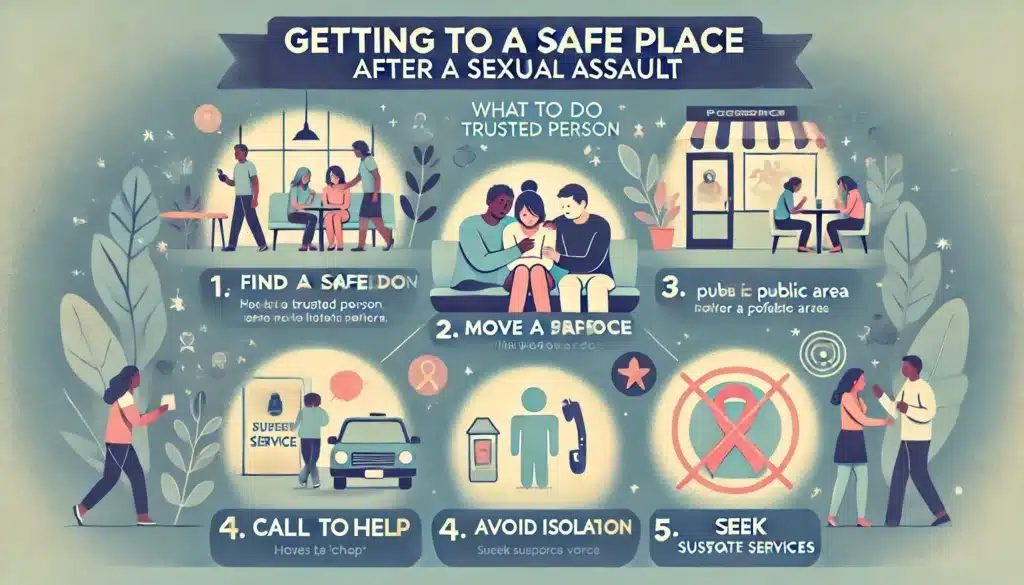
Get to a safe place
Your safety comes first. Get away from the person who hurt you and go somewhere you feel secure, like a friend’s house or a public place. If you’re unsure where to go, some cities have safe houses specifically for assault survivors that offer immediate, temporary shelter. Once you’re safe, reach out for support. Call a trusted friend or family member, or contact a sexual assault hotline for immediate help. Many hotlines offer texting services if you’re not comfortable speaking on the phone.
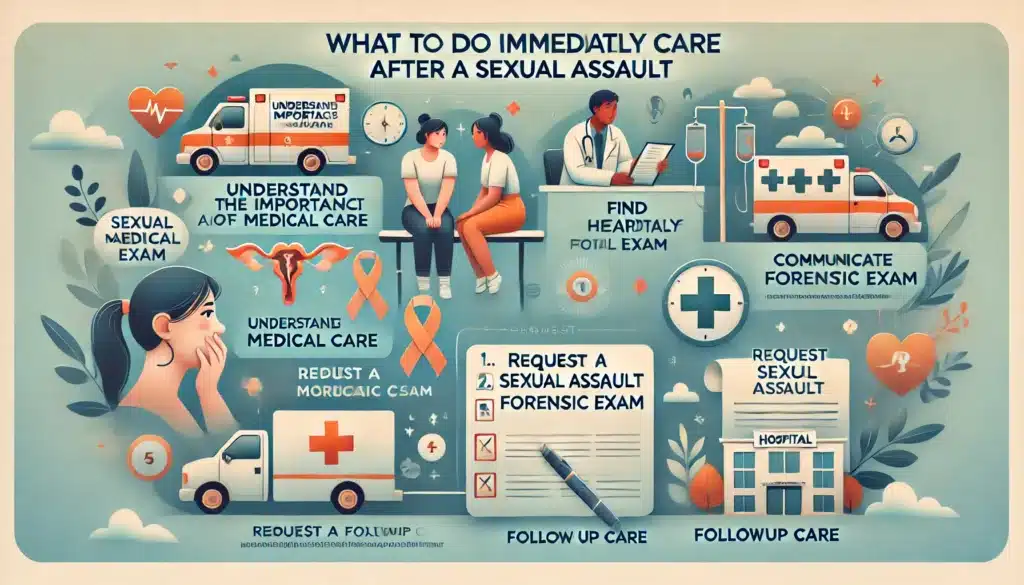
Seek medical care
As soon as you can, seek medical care at a hospital or clinic. They’ll check for injuries and offer treatments to prevent STIs and pregnancy. If you think you might want to report the assault later, ask about getting a forensic exam, also called a rape kit. Some hospitals have specially trained Sexual Assault Nurse Examiners (SANEs) who are experts in collecting evidence and providing compassionate care to survivors.
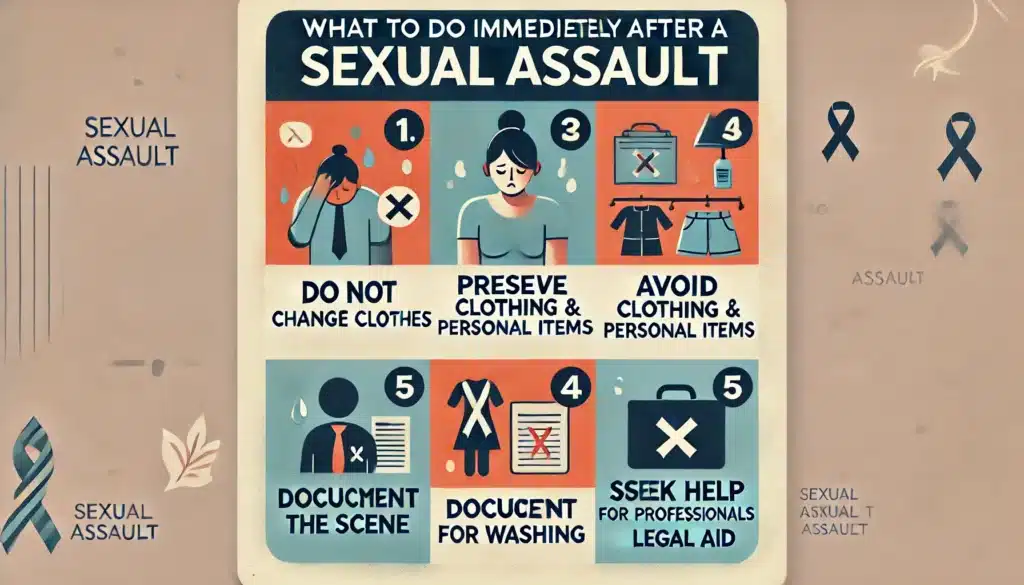
Preserve evidence
Try to preserve evidence if you can. This means avoiding showering, brushing your teeth, or changing clothes before the medical exam if possible. If you do need to change, put your clothes in a paper bag to keep for evidence. Plastic bags can degrade DNA evidence. Also, save any texts, emails, or social media messages related to the assault. Consider using a voice recording app to document your immediate recollections, as memories can fade or change over time.
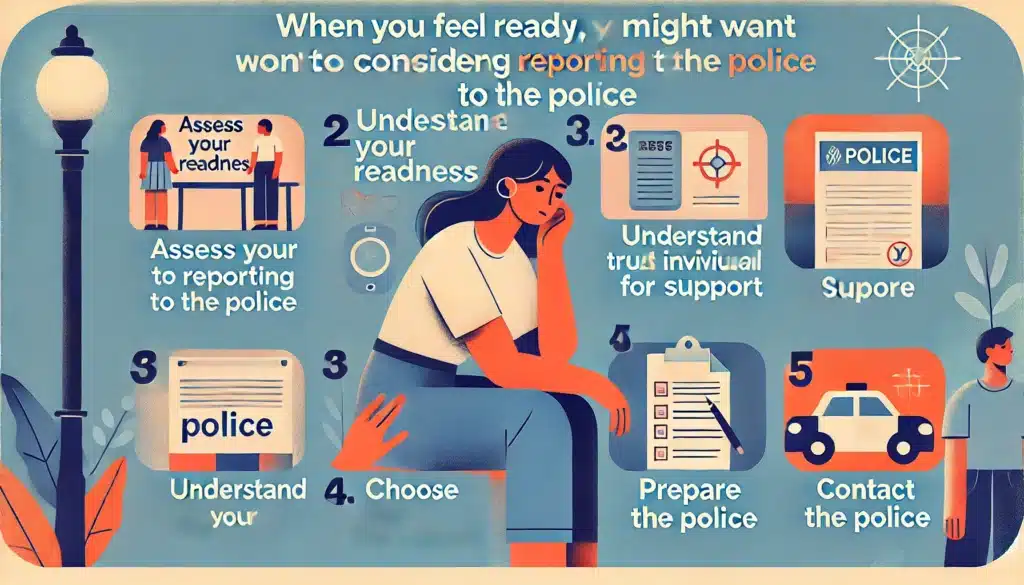
Consider reporting
When you feel ready, you might want to consider reporting the assault to the police. It’s okay to bring a friend or counselor with you for support. Remember, reporting is your choice. You can do it now, later, or not at all. Some jurisdictions offer the option to file a “blind report,” which allows you to provide information about the assault without triggering an immediate investigation.
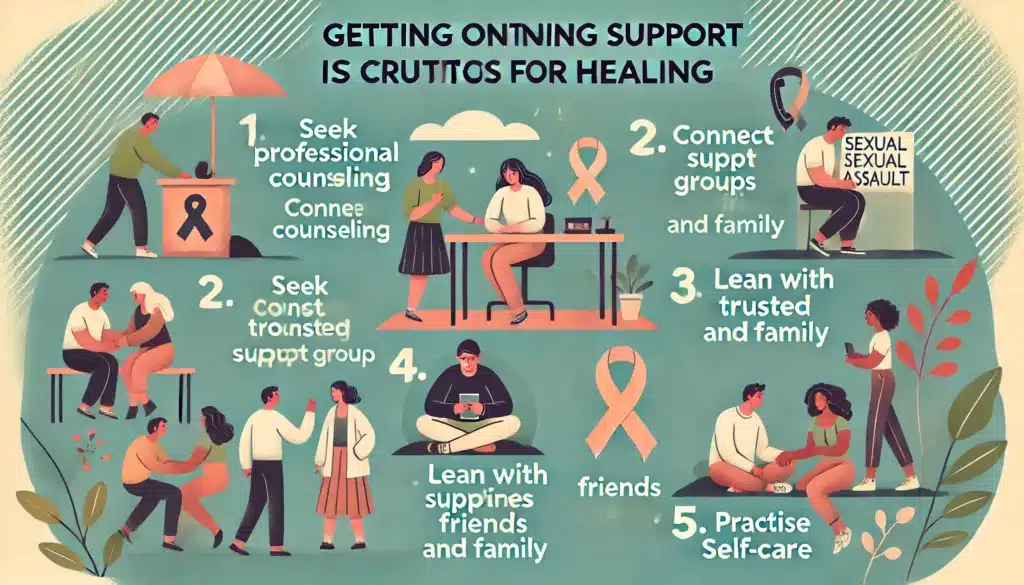
Get ongoing help
Getting ongoing support is crucial for healing. Talk to a counselor or therapist who understands sexual assault trauma. You might also find it helpful to join a support group to connect with others who’ve had similar experiences. Don’t forget to take care of yourself with rest, healthy food, and activities you enjoy. Consider exploring alternative therapies like art therapy or EMDR (Eye Movement Desensitization and Reprocessing), which some survivors find helpful in processing trauma.
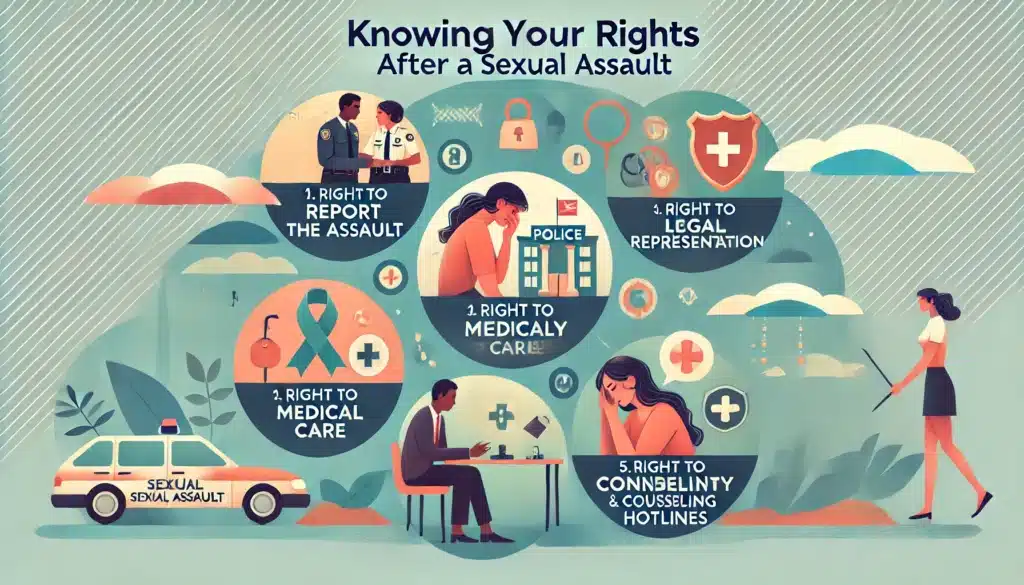
Know your rights
It’s important to know your rights. Learn about victim’s rights in your area and find out about protective orders if you’re worried about your safety. Many states offer Victim of Crime assistance that may help cover expenses related to the assault, including therapy costs. You might also want to consider getting legal help. Our expert injury lawyers offer FREE consultations 24/7 to explain your options. Don’t wait, call us today.

Why choose our sexual assault victim advocates?
we’re committed to supporting survivors in our community
At Wooldridge Law Injury Lawyers, we represent sexual assault survivors. We understand the profound impact of sexual assault, which often leads to emotional trauma, physical injuries, and legal issues. Our sex assault attorneys offers compassionate support and strong legal advocacy for survivors. We investigate each case thoroughly, using our deep knowledge of sexual assault laws to pursue the justice and compensation you deserve. Whether you’re a local or a visitor, our team is here to support you through every step of your recovery and legal journey. If you’ve been affected by sexual assault, you need experienced sexual assault lawyers who understand these sensitive cases and truly care about your well-being.
Call our compassionate sexual assault attorneys
(702) 867-8900Nevada sexual assault law NRS 200.366
What is sexual assault?
According to Nevada Revised Statutes (NRS 200.366), a personal commits sexual assault if they:
- Force someone to engage in sexual penetration against their will.
- Engage in sexual penetration with someone who can’t resist or understand what’s happening due to mental or physical incapacity.
- Engage in sexual penetration with a child under 14 years old.
Exception for young offenders
The law doesn’t apply to someone under 18 who has sexual contact with a child under 14, if they’re no more than 2 years older than the child. However, this exception doesn’t apply if:
- The offender uses force or threats.
- The victim can’t understand or resist due to mental or physical incapacity.
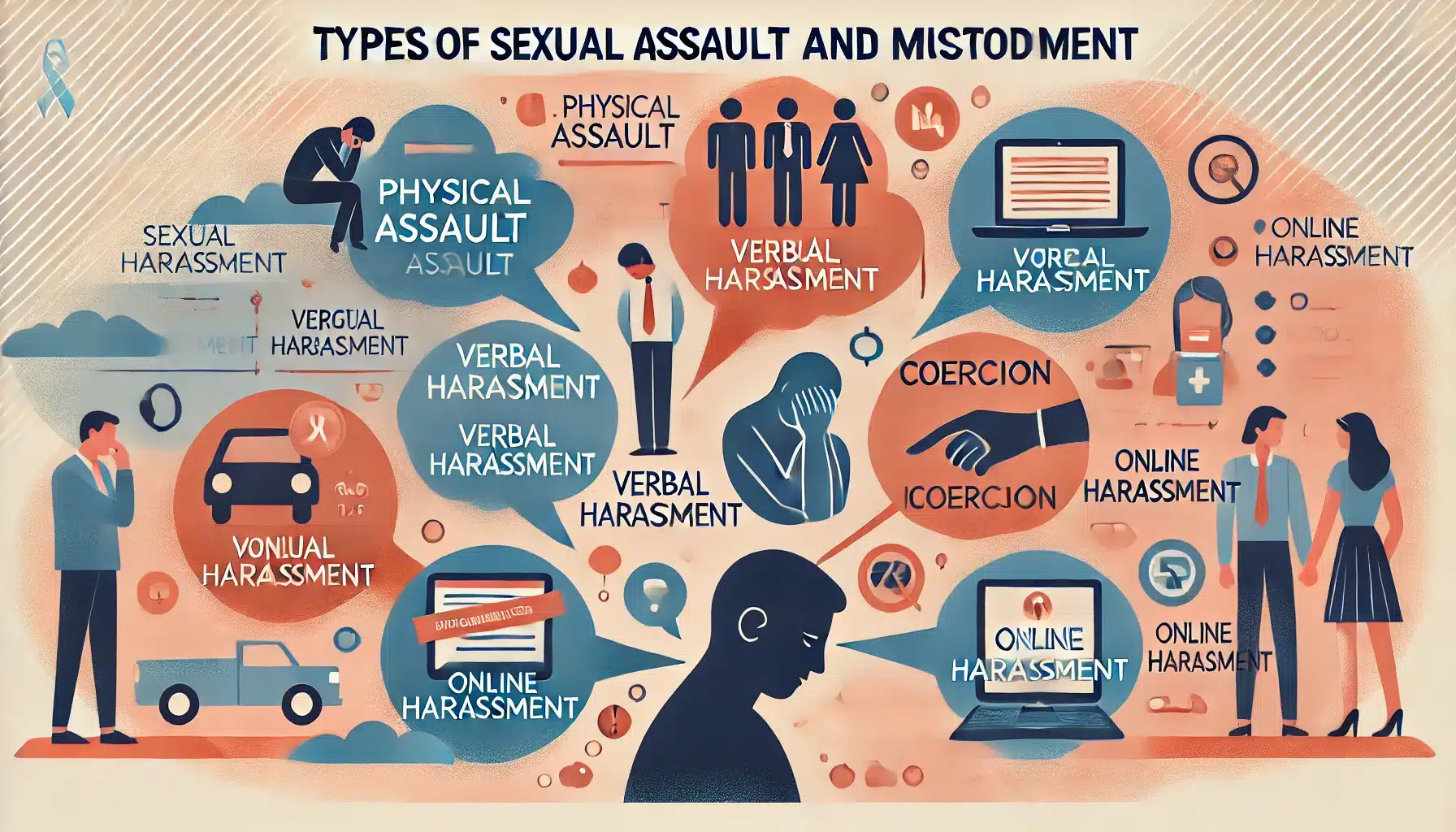
Types of sexual assault cases we handle
There are various types of sexual assault and misconduct. Our sexual assault law firm is dedicated to educating victims about their rights and the laws designed to protect them. Here’s an overview of different types of sexual assault and misconduct:
Elderly sexual assault
Elderly sexual assault is a deeply serious issue that involves the abuse of seniors who are particularly vulnerable, especially those with diminished capacity. This abuse, whether through physical assault or exploitation, can have long-lasting effects on victims and their families. Research shows that in nursing homes and long-term care facilities, other residents can sometimes be the perpetrators, highlighting that elder abuse is not always what we expect.
If you or a loved one has experienced this form of abuse, it is crucial to act immediately. Our experienced sexual assault attorneys are here to provide strong legal support, help secure justice, and protect the rights of our elderly community. We understand the sensitivity and urgency of these cases and are dedicated to offering compassionate, aggressive representation.
Call now for a free, confidential consultation. Do not wait, your call today can be the first step in stopping the abuse and ensuring our seniors receive the protection and justice they deserve. We are available 24/7 to help you through this critical time.
Sexual assault
Sexual assault, also known as rape, is one of the most severe offenses. It involves forced sexual penetration against the victim’s will or sexual acts with someone incapable of consenting due to mental or physical incapacity. Any sexual penetration with a child under 14 years old is also considered sexual assault. Interestingly, some states use gender-neutral language in their sexual assault laws, recognizing that anyone can be a victim or perpetrator regardless of gender.
Statutory sexual
Statutory sexual seduction, commonly known as statutory rape, refers to sexual relations with a person under 16 years of age. Many states include exceptions for close-in-age relationships, often called “Romeo and Juliet” laws. Child molestation, a related but distinct offense, involves sexual conduct targeting children, often perpetrated by someone in a position of trust or authority. Some states allow for civil lawsuits against child molesters even after the criminal statute of limitations has expired, providing additional avenues for justice.
Unwanted sexual contact
Unwanted sexual contact encompasses any non-consensual physical contact of a sexual nature, ranging from unwanted touching to more invasive acts. This category is broad and can include various behaviors that violate personal boundaries. It’s worth noting that in some jurisdictions, even seemingly minor acts like unwanted hugging can be prosecuted under sexual battery laws.
Sexual Harassment
Sexual harassment involves unwanted sexual advances or propositions and creating a hostile environment through sexual comments or behavior. This can occur in various settings, including workplaces and educational institutions, and can have significant impacts on victims’ personal and professional lives. An emerging area of concern is the rise of sexual harassment in virtual reality environments, presenting new challenges for lawmakers and enforcers.
Domestic sexual abuse
Domestic sexual abuse refers to sexual abuse within intimate relationships or families. It’s often part of a broader pattern of domestic violence and control, making it particularly complex to address and resolve. Recent research has highlighted the often-overlooked issue of sexual abuse within LGBTQ+ relationships, emphasizing the need for inclusive support services and legal protections.
sexual assault law firm
If you’ve experienced sexual assault, you may be facing emotional trauma, medical expenses, and life-altering challenges. Our compassionate sexual assault attorneys will fight tirelessly to protect your rights and seek the compensation you deserve. Don’t let perpetrators or unsympathetic institutions silence you. Contact us for a free, confidential consultation today.
schedule a free confidential consultationDifference between criminal and civil legal action for sexual assault cases
Civil sexual assault cases
- Initiated by the victim (plaintiff)
- Victim has more control over the proceedings
- Goal is to compensate the victim for harm suffered
- Lower standard of proof: “preponderance of the evidence”
- Can proceed even if criminal case results in acquittal
- Potential for monetary compensation covering medical bills, lost wages, and mental health support
- Can hold corporations, like hotels, casinos, elderly nursing homes, and long-term care facilities accountable for negligence
Criminal sexual assault cases
- Initiated by the state on behalf of “the people”
- Prosecutor represents the case against the perpetrator
- Victim’s role is primarily as a witness
- Goal is to punish the offender
Higher standard of proof: “beyond a reasonable doubt” - Potential consequences include imprisonment, fines, and criminal record
- Process involves police investigations and court appearances
- Verdict does not guarantee compensation for the victim
our sexual assault law firm is available 24/7
(702) 867-8900Damages claimed in sexual assault cases
Sexual assault survivors may be entitled to various types of compensation. At Wooldridge Law Injury Lawyers, we help clients understand and pursue the full range of damages available. These damages may include:
Medical expenses
Emergency care costs, follow-up treatments, long-term medical needs, and medications.
Mental health care
Therapy sessions, psychiatric treatments, and medication for mental health conditions.
Lost income
Wages lost due to recovery time, reduced earning capacity, and career changes necessitated by the assault.
Pain and suffering
Emotional distress, loss of enjoyment of life, and PTSD and anxiety.
Property damage
Replacement of damaged personal items, and costs associated with changing residences for safety.
Legal fees
Attorney costs, court fees, and expert witness expenses.
Determining accountability in sexual assault claims
Determining accountability in sexual assault cases is complex. At Wooldridge Law Injury Lawyers, our sexual assault attorneys conduct thorough investigations to identify all responsible parties. Potential liable entities may include:
The Perpetrator
The individual who committed the assault bears direct responsibility for their actions. Our focus is on establishing clear evidence of their culpability through careful examination of all available facts and testimonies.
Employers
Companies may be held accountable if their negligent hiring practices led to the assault. This includes failures in conducting proper background checks, ignoring previous complaints about an employee’s behavior, or not providing adequate security measures in the workplace. We scrutinize employment records and company policies to uncover any lapses in duty of care.
Property owners
Owners of premises where an assault occurred may be liable if they failed to implement sufficient security measures or maintain safe conditions. This could involve inadequate lighting, faulty locks, or a lack of proper surveillance. Our team assesses the property’s safety protocols and history of incidents to establish potential negligence.
Institutions
Organizations such as schools, hospitals, or care facilities have a heightened responsibility to protect vulnerable individuals under their supervision. If they fail in this duty through inadequate oversight or ignoring known risks, they can be held accountable. We examine institutional policies, staff training records, and incident reports to identify any systemic failures.
Third-party security companies
When contracted to provide protection, these companies must fulfill their duties diligently. If they’re found negligent in their contracted responsibilities, such as failing to properly patrol an area or respond to threats, they can be held liable. We review service contracts and performance records to assess their adherence to agreed-upon security measures.
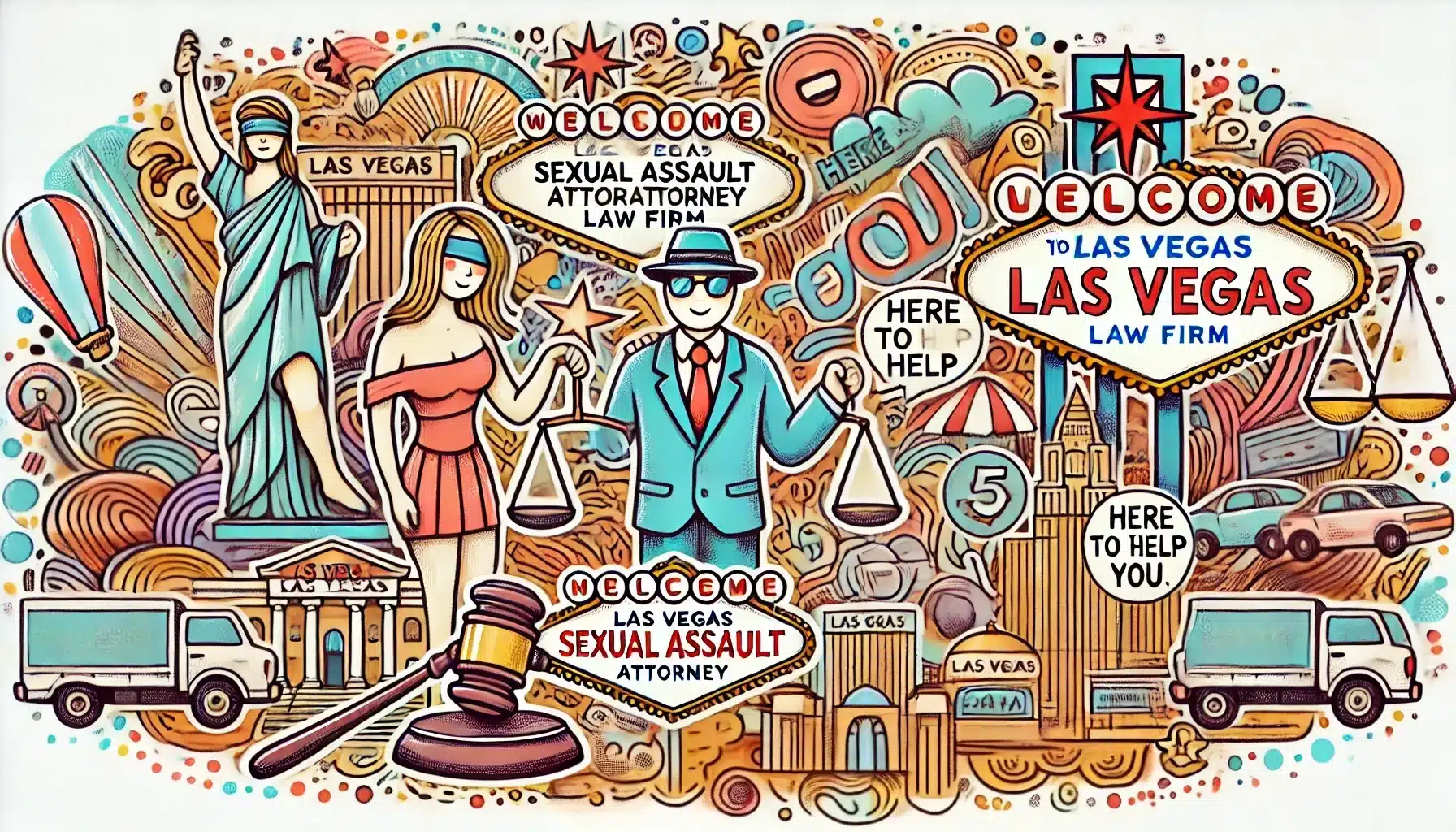

visit our sexual assault attorneys for a free consultation
If you’ve been a victim of sexual assault, or if you’re seeking justice for a loved one, visit the offices of Wooldridge Law Injury Lawyers. Can’t make it to our office? We’ll come to you! Call us now, or contact us through our website, to schedule your FREE consultation with an experienced member of our legal team.
Frequently asked questions about sexual assault legal claims
What is the statute of limitations for filing a sexual assault lawsuit in Nevada?
The statute of limitations in Nevada for sexual assault is generally 20 years from the date of the assault for adults, or 20 years after a minor victim turns 18.
Additional details:
- No time limit if reported to law enforcement within 20 years
- No time limit if DNA evidence identifies the perpetrator
Can I file a civil lawsuit for sexual assault even if there’s no criminal conviction?
Yes, you can file a civil lawsuit for sexual assault without a criminal conviction. Civil cases have a lower burden of proof than criminal cases.
Key points:
- Civil standard: “preponderance of evidence”
- Seek monetary compensation for damages
- Can proceed independently of criminal cases
- May hold additional parties accountable (e.g., negligent employers)
What types of compensation can I seek in a sexual assault civil case?
Compensation in sexual assault civil cases typically includes medical expenses, therapy costs, lost wages, pain and suffering, and emotional distress damages.
Potential compensation types:
- Medical expenses (current and future)
- Therapy and mental health treatment
- Lost wages and earning capacity
- Pain and suffering
- Emotional distress
- Punitive damages (in extreme cases)
How long does a sexual assault lawsuit typically take?
A sexual assault lawsuit typically takes between 6 months to 3 years, depending on the complexity of the case and whether it goes to trial.
Factors affecting duration:
- Case complexity
- Evidence volume
- Number of parties involved
- Court schedules
- Settlement negotiations
Do I need a lawyer to file a sexual assault lawsuit?
While not legally required, hiring a lawyer for a sexual assault lawsuit is strongly recommended due to the complex nature of these cases and the emotional support they can provide.
Benefits of hiring a lawyer:
- Expertise in legal procedures and deadlines
- Effective evidence gathering and presentation
- Skilled negotiation with opposing parties
- Accurate claim value assessment
- Emotional support and objectivity
For expert legal assistance with your sexual assault case, contact Wooldridge Law Injury Lawyers for a free, confidential consultation.
If you or a loved one has been a victim of sexual assault or misconduct, you don’t have to face this alone. At Wooldridge Law Injury Lawyers, we are committed to providing compassionate, confidential, and aggressive legal representation to help you seek justice and compensation. Contact us today for a free, no-obligation consultation. Let us fight for your rights while you focus on healing.
Areas We Cover
We have an extensive service area covering Southern Nevada. Below are just some of the cities and neighborhoods we service nearby:
Angel Park
Blue Diamond
Boulder City
Centennial Hills
Charleston Heights
City Center Plaza
Desert Shores
Downtown Las Vegas
Downtown South
East Las Vegas
Enterprise
Kyle Canyon
Henderson
Lake Las Vegas
Las Vegas
Lone Mountain
McCarran international Airport
North Las Vegas
Paradise
Rhodes Ranch
Southern Highlands
Spring Valley
Summerlin
Summerlin South
Summerlin West
Sunrise Manor
Sun City Summerlin
The Lakes
The Pueblo
The Springs
West Las Vegas
Whitney
Winchester















